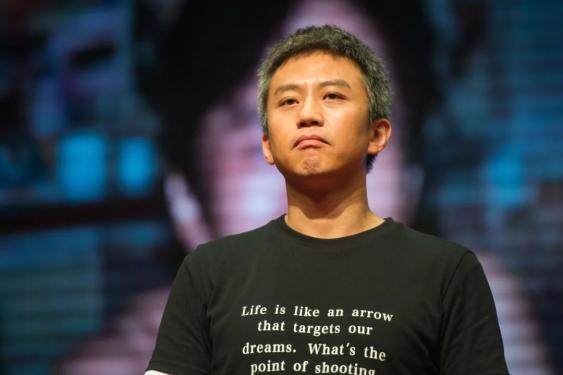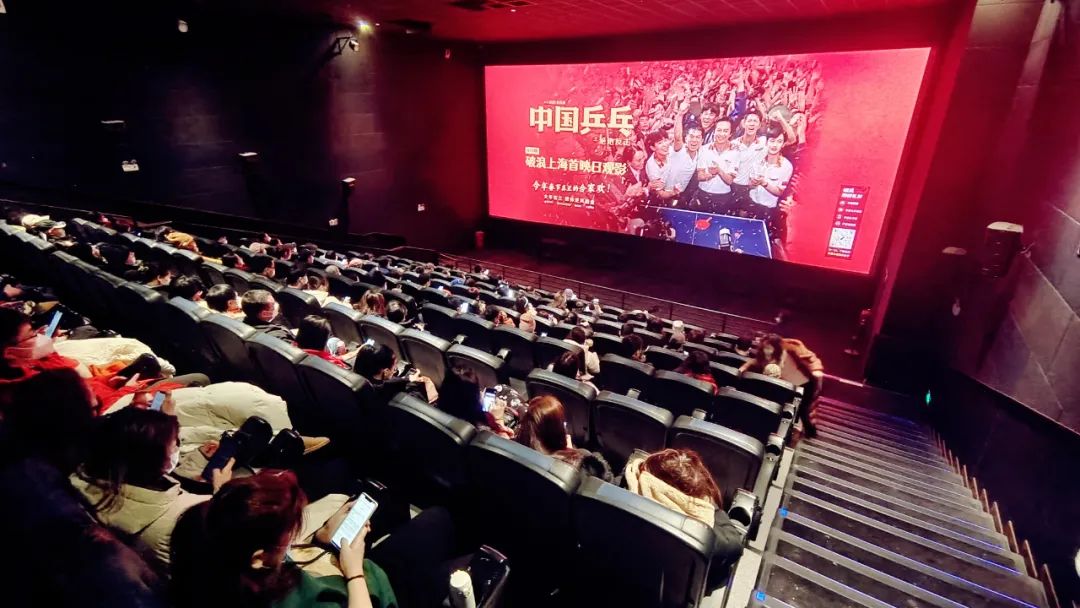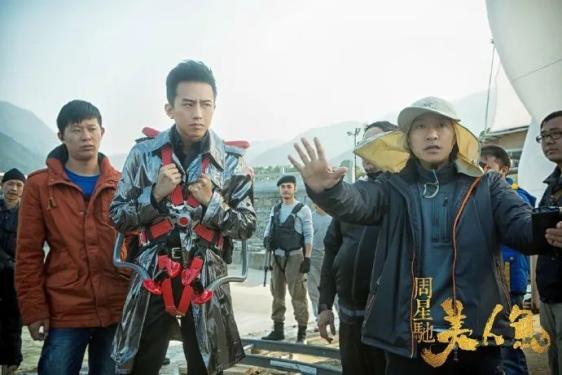Original, Ren Shangkun, business personality

Author: Ren Shangkun
Source: Business figures (ID: biz-leaders)
On Jan. 23, the second day of the new year, Deng Chao had a dream. He dreamed of Xin Xiaofeng. It was his character in the suspense film "Burning Sun," a character who was extremely restrained because he was on the run for a homicide. That year, Deng Chao, Duan Yihong and Guo Tao won the China Golden Rooster Award for Best Actor. Until now, his performance in that film is still regarded by outside audiences as the peak of his acting skills.
When Deng Chao dreamed, he felt like he was in the movie again. He said he "couldn’t breathe." He remembered going to the sea to complete a shot. He felt uneasy and confused.
"Adventure"
On the third day of the new year, "Chinese Ping Pong: The Jedi Strike Back" directed by Deng Chao and Yu Baimei was released. But soon, less than two days after meeting the audience, the film was announced to be withdrawn, adjusted to a small-scale screening from the fifth day of the new year, and postponed to the official release on February 17.
Regarding the reason for the withdrawal, the producer said that due to the major mistakes and serious deficiencies in the decision-making, preparation and promotion of the publicity and distribution team, the film fell into a particularly passive situation during the Spring Festival.

Less than two days after its release, "Chinese Ping Pong" announced its withdrawal. Source: Visual China
As a newcomer to the transformation of a well-known actor and director, he and his partner Yu Baimei once caused "group ridicule" and became the representative of bad movies. Deng Chao understands the voices of the outside world. In recent exchanges with the media about "China Ping Pong: The Jedi Strikes Back", one of his recurring phrases was, "Is there an elephant in the room to pretend not to see?" In Deng Chao’s words, the theme of the film is not success, but "failure", which is for those who are not optimistic.
After missing the Spring Festival, a family-friendly stew, people’s nerves were slightly loosened, and they wound up again to welcome the reality of the new year. Deng Chao told the story of national table tennis falling into the Jedi, and he had to face the situation of the current atmosphere retreating.
In the film and television industry, there are not a few people who act well and guide well. From the current public information, there is still a very definite answer as to why Deng Chao became a director and why he chose such a recognized and unconventional theme as competitive sports.
He said he was an adventurous person.
The Chinese women’s volleyball team, formerly directed by Chen Kexin, was changed to "Winning the Championship". According to Chen’s self-report, the filming of the women’s volleyball team was the most difficult film he had ever made. Deng Chao focused on the national ping, and in addition to the conceivable value narrative, the official statement also implied the personal experience of the main creator. Yu Baimei said, "When the national players played the game, they completed it under what difficult circumstances. Let’s see how they went on. If they can go on, we must also persevere." From the father-son "Galaxy Tutoring School" to today’s Chinese ping pong, Deng Chao’s story transmission method has not changed much, as Yu Baimei said above.
Deng Chao’s dream of directing still has a long way to go.
This time, "Chinese Table Tennis Jedi Counterattack" is aimed at the 1995 Tianjin World Table Tennis Championships. Dai Minjia, who was modeled after Cai Zhenhua, the national table tennis leader at that time, led the decision to return from abroad, linking up coaches, players and the process of social evolution.
It was indeed a pivotal battle in the history of national table tennis. Before that, the men’s team of the national team had suffered consecutive losses at the World Table Tennis Championships held every two years from 1989 to 1993. At the 1991 World Championships in Chiba, Japan, the men’s team ranked seventh, the worst season in history. The men’s team championship medal won by the national table tennis 18 years ago was a turning point for the national table tennis team and marked the arrival of a new era.
The question is how to present it?
For such a film that audiences can roughly think of the story and ending direction when they hear the title, the director Deng Chao puts it more from the perspective of the head coach. The description used in the film for the personnel dilemma facing the national ping as a whole at that time is: "Injured, blind, small, old". As for the individual "arc light", including the prototype Liu Guoliang, Kong Linghui and other national ping five tigers, and even Deng Chao’s coach Dai Minjia’s prototype Cai Zhenhua, it is still a rare item.
Bite the score
Under the narrative of the country and the grand goal of winning gold, the film gradually moved towards the road of "blood counterattack". Behind the victory, the film gave a high-flying summary answer at the end: "The Chinese are the most diligent people in the world".
During the intense promotion period, Deng Chao emphasized the training process of himself and other actors. To restore his technique, he practiced playing with his left hand. From the accounts of him and Yu Baimei, "burning", "winning" and "competition" are high-frequency words.
In addition to people, Deng Chao’s focus is still on "technology".
To this end, the main creative team spent a lot of effort. This is slightly different from the director Chen Kexin. Chen Kexin has selected a lot of real people who have no acting experience to appear on the scene, including Lang Ping’s daughter playing the young Lang Ping when he was an athlete, and active athletes Zhu Ting and Hui Ruoqi playing themselves. The middle-aged coach Lang Ping is played by Gong Li.
Chen Kexin said that after a period of time, he found that "it is easier to train players to act than to train actors to play." That is muscle memory and the daily life of players. In the film, Lang Ping has a line that it is not important to win, but to bite the score.
Competitive sports is a subject rarely covered in domestic movies. It has natural obstacles, including the resulting market difficulties.
No matter Chen Kexin or Deng Chao, it is predictable that it is difficult to penetrate into the more specific and complex environment behind the athletes and coaches. This is probably one of the reasons why Chen Kexin focuses on the iron hammer with great personality and the cultural drama behind the event.
As for the industry situation, Cao Baoping, the director of "Burning Sun", made a metaphor: "If you give them another 50 years of Chinese football, it can’t be good. It can’t be good because you don’t have it. Your whole mechanism and system don’t say that it starts with children, and then cultivates every seedling, and then let him know what the technology of football and the magic of football are."
"A movie doesn’t have to be a parody show. No matter how much you learn from a person, if you don’t have that aura, you will always be a parody show." Chen Kexin also failed to escape the value narrative, and the emotional drama is too divided into similar films. However, when it comes to presenting domestic competitive sports itself and its problems, Chen Kexin has gone a step further, or for some conceivable reasons, it has appeared a little more.
short board
In a recent interview with The Beijing News, Deng Chao admitted to his lack of ability as a director. He said that he and Yu Baimei once made a very failed movie, and they couldn’t sleep for many days, often with a face that was as gray as death.
But he also says he needs to face up to his shortcomings. "If you don’t play well, practice your playing style; if the racket glue doesn’t work, do the glue; if the tactics are not good, practice the tactics." He just doesn’t know if he knows where the shortcomings are.
In 2013, after the contract between Deng Chao and Huayi expired, he partnered with Enlight Media to establish "Orange Image", served as the chairman of the board, and began investing in movies. His first film was "The Breakup Master," released in 2014, starring Deng Chao and starring Yang Mi, who was popular at the time. The list of supporting actors is also extensive, including Liu Yan, Gulinazar, Wu Jing, Xie Nan, Jinxing and Han Han. In 2015, another masterpiece, "Villain Angel," by him and Yu Baimei, was launched.
During that time, Deng Chao once felt that he had glimpsed the code of comedy. "Breakup Master" grossed 660 million yuan at the box office, and "Villain Angel" was nearly 500 million. Feng Xiaogang’s "Old Cannon" starring in the same period was less than half that. "Breakup Master" and "Villain Angel" scored 5.1 and 4.4 on Douban, respectively.
In 2016, Stephen Chow’s "Mermaid" went live, and Deng Chao was the male lead. The film broke the box office 1 billion in four days, with a total box office of about 3.40 billion yuan. According to Deng later, Chow said he would be "the king of comedy in the future." Since then, Deng Chao began to reflect on his understanding of comedy. He decided to change direction.

Image source: The official Weibo of the movie "Mermaid"
"Galaxy Tutoring School," which deals with Chinese education, was released in 2019, and the box office is still good, surpassing 800 million in a week. On Douban, the film has a rating of 6.2.
The box office was high, and the reputation slipped. Accompanied by this, Deng Chao became a variety bar in the "Running Man" program for several years.
In terms of popularity alone, Deng Chao is not inferior to other actors. He also has no shortage of industry resources. Deng Chao has a share of "China Partner" directed by Chen Kexin and "Shadow" directed by Zhang Yimou. The screenwriter Liu Heng recommended Deng Chao as the second male in the first film "Assembly Number", which Feng Xiaogang’s transformation breakthrough. Deng Chao and Liu Heng are old acquaintances. The "Young Son of Heaven" written by Liu Heng was released in 2003. Deng Chao starred in Shunzhi, and he also rose to fame and became an "emperor professional". Deng Chao was 23 when he made that film. After that, Deng Chao starred in a series of TV series and met Sun Li in "Happiness is Like a Flower". Both the director and the screenwriter praised Deng Chao’s talent. He later turned into a director and was blocked, and once again proved his acting skills with "Burning Heart in the Sun".
What is the difference between the early actor Deng Chao and the director Deng Chao?
Coach and director
In the national table tennis film directed this time, he starred as a coach.
In "Winning the Championship", Chen Kexin gave Lang Ping, played by Gong Li, many close-ups, such as eyes and glasses, a rotating pen in his hand, and a notebook sitting in the stands to draw battle charts. Calm, but powerful. No roars.
So far, more than a decade later, Deng Chao’s past roles still show a stable consistency. In addition to the funny comedy he longs for, every time he combs his back, it feels like he has returned to the "Chinese Partner" of the past.
As a high-profile actor, Deng Chao has been seeking breakthroughs in recent years, switching between different tracks. From "Young Son of Heaven" to "Burning Heart of the Sun" and later "Shadow", which has a depressing atmosphere like black and white ink splashing, Deng Chao plays an inwardly anxious, confused and hesitant character. His feelings, understanding and emotional communication are the best among actors.
Cao Baoping, a representative of the sixth generation of domestic directors, met Deng Chao as early as when he was filming "Li Mi’s Conjecture." He once told Deng Chao, "Chao, 95% of you are very good, but only 5% still has a red carpet smell." Deng Chao interpreted this sentence as, "He doesn’t want you to have your own thing in the play, to become the character itself." Cao Baoping shared his views on directors with the media, saying that the director’s foundation is thinking about life, more analysis, and then requirements and judgments, and then narrative.
In recent years, Deng Chao has been a frustrated director. His wife, Sun Li, recently interviewed the media, saying that Deng Chao looks carefree, but he actually has a lot of scruples and cares about the emotions and opinions around him. But she feels that he is also changing.
This time, the star Deng Chao, who has always been at the forefront of the topic trend, will become a good director in the audience’s mouth?
The audience had expectations, and so did Deng Chao.
* Headshot purchased from Visual China
Original title: "Deng Chao, it’s so hard to be a director!"
Read the original text
关于作者